Here is my plot "summary" of Die drei Männlein im Walde from Brüder Grimm.
There was a man whose wife was dead, and a woman, whose husband was dead. They both had daughters who knew each other. Then the woman asked the man's daughter to have her father marry her, and then she would drink wine and bath in milk every morning, (don't ask; that's what I think it says) and then her daughter would drink water and bath in water. The man reluctantly agreed; there was a bit about him taking off his boots and filling it with water (don't know what that was about) and something about his boots having a hole in it. But they got married anyways, and they did what they were going to do about drinking and bathing; on the second morning, they both drank water and bathed in water, and then on the third morning (and thereafter) the man's daughter drank water and bathed in water and the other one drank wine and bathed in milk. Apparently, the woman was jealous about her daughter being ugly, and her stepdaughter being beautiful.
During winter, the stepmother made her stepdaughter go outside and fill a basket with strawberries while wearing clothes made of paper, and gave her a piece of hard bread (of course there aren't any strawberries in winter...). She found a little hut in the woods and went inside because it was warm. Three little men came by and asked for food; she gave them some of her bread, and told them she was looking for strawberries. They gave her a broom and told her to sweep away the snow from the back door. Then the three little men discussed what they should give the girl for helping them. One said to make her prettier every day. The second said to have her words turn to gold. The third said to have a king come and take her away to his castle (I guess it's a castle it was Gemahlin, but I thought a castle was a Schloß; don't really know).
The girl finished sweeping the snow and found deep red strawberries where she was sweeping. She filled her basket and went home. Then she found her words did turn into gold. The stepmother wanted the same thing to happen to her daughter, so she gave her butterbread and cakes and warm clothes (I suppose a Pelzrock is some sort of skirt made of some warm fur) and sent her to look for strawberries in the forest. She did find the three little men, but gave them nothing to eat, and didn't sweep the snow away from the backdoor. The three little men discussed what to give her; they said to make her uglier every day, and her words would turn into toads (I guess that's what Kröte amounts to I mean Schildkröte is a turtoise, so I thought maybe it was a compound word for an armored/shielded toad.), and the last one said she would die an unfortunate/unpleasant death. The girl couldn't find any strawberries, so she returned home and tried to tell her mother what happened, but toads came out of her mouth.
Of course, that made the mother angrier, since her daughter still wasn't any prettier, and her stepdaughter was prettier and her words turned into gold. She ended up taking a cauldron, and made the stepdaughter go outside with an axe and look for something in the river (Okay, I don't really know what Garn is exactly, but it said something about a frozen river and a hole in the river, so it was probably some sort of sea/freshwater creature.). A king happened to be passing by and saw the stepdaughter doing what her stepmother was making her do. He felt sorry for her (and partly because she was beautiful) and asked if she wanted to come with him; she said she did. Apparently, the stepmother and daughter found out what happened to her and visited her after a year. She already had a son. The stepmother and daughter threw her out her bedroom window and the daughter disguised herself under the bed covers, and as the king came by, the stepmother said she was sick and couldn't talk. He believed that until he tried to speak to her in the morning, and her words turned into toads. The stepmother said that she was simply very sick.
(Okay, now it gets wierd) A duck swam by and asked a young servant what her guests were doing, and what her child was doing, to which he replied they were sleeping. She transformed into her original form and gave him something to drink and put him to bed. She did this for three nights, and on the last, she told the boy to tell the king to take his sword and swing it over her three times. He did this, and she returned to her original form. The king immediately recognized her. Then the king asked the stepmother what to do with people who dragged people out of bed and threw them into the water. She replied that they should be placed in a barrel and rolled from a mountain into a river. The king then had this done to the stepmother and her daughter.
Monday, November 2, 2009
Friday, October 23, 2009
October 10, 2009
I haven't updated this thing for awhile. Oh well; I've still found some stuff to read. Additionally, I've been playing Legend of Dragoon in German, without having beaten it in English previously, so I got most of the storyline in German. I'm also doing the same with Majora's Mask. I have also read Bewährung der Herzen, and learned some words like taub, stumm, Taubstumme, and Sprosse--additionally, I have an idea of what Rippelsamthosen is, even though all the German speaking people I've talked to haven't seen it.
The following is a summary of Die sieben Raben, a story from Grimms Märchen.
There was a man who had seven sons, and he had always wanted to have a daughter. He eventually had one, and sent his sons to fetch water. They were eager to see their new sister (If I read this correctly), and accidentally fell into the well. Their father got impatient waiting for them, and thought they forgot about the water over some game, and wished they were ravens--his wish came true.
Apparently, his daughter grew more and more beautiful, but her parents never told her about her brothers; they didn't want to. She found out somehow, probably from other people, and her parents finally revealed the truth. They said it wasn't her fault. She wanted to find her brothers, so she set off with a stool for when she got tired, bread for when she got hungry, and water for when she got thirsty. They also gave her a ring (possibly to remember them).
She went to the end of the world and to the sun; it was too hot and scary. She went to the moon; it was too cold, evil and cruel. She went to the stars, which sat on her stool and were nice and friendly; they told her her brothers were in Glasberg and gave her some sort of object (possibly a key) so that she could go there. She wrapped it in a cloth. When she got there, she lost it, and (If I'm reading this correctly) cut off her small finger and stuck it in the gate. She met a small dwarf there, who said her brothers were away, and to wait for them to come back. As they waited for them to come back, the dwarf laid out seven plates and goblets of food; she ate a bit from every plate and drank a bit from every goblet, and then she put her ring in the last goblet.
The seven ravens came back and found someone had eaten their food. When they found the ring and realized it was their sister, they wished they were human again. They went home happily.
Now I don't actually know if Raben is a raven, but it does say "blickte auf und sah sieben kohlenschwarze Raben auf und davon fliegen." for "...he looked up and saw seven coal black ravens (up) and flew." This at least indicates that Raben, whatever they are, can fly. "Auf einmal hörte es in der Luft ein Geschwirr und ein Geweh, da sprach das Zwerglein »jetzt kommen die Herren Raben heim geflogen«" which means "On hearing a whir and a cry in the air at once, the dwarf spoke 'The ravens are flying home now.'" (I don't actually know about "Geschwirr" or "Geweh"; I can just guess, but "geflogen" does mean they flew, and they were heard from the air, so it must at least be a bird, if it isn't a raven.
Here is another listening exercise. I took the song, Los from Rammstein and decided to find all the words in it that contained the suffix, -los, which is the equivalent of using the suffix -less in English.
Wir waren namenlos,
und ohne Lieder,
richt wortlos,
waren wir nie wieder,
etwas sanglos,
sind wir immer noch,
dafür nicht klanglos,
Man hört uns doch,
nach einen Winch dos,
Gingen sturmlos,
einfach beispiellos,
es würdet Zeit,
Los,
Sie waren sprachlos,
So sehr schockieren,
sehr ratlos,
Was zwar passiert,
etwas fassungslos,
und garantiert,
verstrecklichlos,
Das wurd setziert,
Sie sagten grundlos,
Schaden um die Noten,
So schamlos,
Das gehört verboten,
Es ist geistlos,
Was sie da probieren,
zu geschmacklos,
wie sie nur sitzieren,
Es ist hoffnungslos,
sinnlos,
hilflos,
sie sind Gott,
los,
Wir waren namenlos,
Wir haben eine Namen,
waren wortlos,
Die Worter kamen,
etwas sanglos,
sind wir immer noch,
Dafür wir klanglos,
Das hört man doch,
Die sind nicht fielerlos,
zu etwas haltlos,
Wir werden lautlos,
und schneelos,
Wir waren namenlos,
und ohne Lieder,
richt wortlos,
waren wir nie wieder,
etwas sanglos,
sind wir immer noch,
dafür nicht klanglos,
Man hört uns doch,
nach einen Winch dos,
Gingen sturmlos,
einfach beispiellos,
Für die Zeit los,
Wir waren los,
Wir waren los.
Again, there are some words I'm not entirely familiar with, or didn't hear properly.
namenlos - nameless
wortlos - wordless (additionally, this may be mistaken for wertlos, which sounds similar, for worthless.)
sanglos - songless
klanglos - without sound
sturmlos - without turmoil
beispiellos - without example
sprachlos - speechless
fassungslos - (I don't entirely know, although I would guess "incomprehensible")
verstrecklichlos - effortless, perhaps?
grundlos - without reason
schamlos - shameless
geistlos - spiritless
geschmacklos - tasteless
hoffnungslos - hopeless
sinnlos - without reason/rationality
hilflos - helpless
fielerlos - without mistake (this might also be fehlerlos, but it sounded more like "fielerlos")
haltlos - unstoppable
lautlos - without sound
schneelos - without snow
I should also say now that "los" is also an interjection meaning "go".
The following is a summary of Die sieben Raben, a story from Grimms Märchen.
There was a man who had seven sons, and he had always wanted to have a daughter. He eventually had one, and sent his sons to fetch water. They were eager to see their new sister (If I read this correctly), and accidentally fell into the well. Their father got impatient waiting for them, and thought they forgot about the water over some game, and wished they were ravens--his wish came true.
Apparently, his daughter grew more and more beautiful, but her parents never told her about her brothers; they didn't want to. She found out somehow, probably from other people, and her parents finally revealed the truth. They said it wasn't her fault. She wanted to find her brothers, so she set off with a stool for when she got tired, bread for when she got hungry, and water for when she got thirsty. They also gave her a ring (possibly to remember them).
She went to the end of the world and to the sun; it was too hot and scary. She went to the moon; it was too cold, evil and cruel. She went to the stars, which sat on her stool and were nice and friendly; they told her her brothers were in Glasberg and gave her some sort of object (possibly a key) so that she could go there. She wrapped it in a cloth. When she got there, she lost it, and (If I'm reading this correctly) cut off her small finger and stuck it in the gate. She met a small dwarf there, who said her brothers were away, and to wait for them to come back. As they waited for them to come back, the dwarf laid out seven plates and goblets of food; she ate a bit from every plate and drank a bit from every goblet, and then she put her ring in the last goblet.
The seven ravens came back and found someone had eaten their food. When they found the ring and realized it was their sister, they wished they were human again. They went home happily.
Now I don't actually know if Raben is a raven, but it does say "blickte auf und sah sieben kohlenschwarze Raben auf und davon fliegen." for "...he looked up and saw seven coal black ravens (up) and flew." This at least indicates that Raben, whatever they are, can fly. "Auf einmal hörte es in der Luft ein Geschwirr und ein Geweh, da sprach das Zwerglein »jetzt kommen die Herren Raben heim geflogen«" which means "On hearing a whir and a cry in the air at once, the dwarf spoke 'The ravens are flying home now.'" (I don't actually know about "Geschwirr" or "Geweh"; I can just guess, but "geflogen" does mean they flew, and they were heard from the air, so it must at least be a bird, if it isn't a raven.
Here is another listening exercise. I took the song, Los from Rammstein and decided to find all the words in it that contained the suffix, -los, which is the equivalent of using the suffix -less in English.
Wir waren namenlos,
und ohne Lieder,
richt wortlos,
waren wir nie wieder,
etwas sanglos,
sind wir immer noch,
dafür nicht klanglos,
Man hört uns doch,
nach einen Winch dos,
Gingen sturmlos,
einfach beispiellos,
es würdet Zeit,
Los,
Sie waren sprachlos,
So sehr schockieren,
sehr ratlos,
Was zwar passiert,
etwas fassungslos,
und garantiert,
verstrecklichlos,
Das wurd setziert,
Sie sagten grundlos,
Schaden um die Noten,
So schamlos,
Das gehört verboten,
Es ist geistlos,
Was sie da probieren,
zu geschmacklos,
wie sie nur sitzieren,
Es ist hoffnungslos,
sinnlos,
hilflos,
sie sind Gott,
los,
Wir waren namenlos,
Wir haben eine Namen,
waren wortlos,
Die Worter kamen,
etwas sanglos,
sind wir immer noch,
Dafür wir klanglos,
Das hört man doch,
Die sind nicht fielerlos,
zu etwas haltlos,
Wir werden lautlos,
und schneelos,
Wir waren namenlos,
und ohne Lieder,
richt wortlos,
waren wir nie wieder,
etwas sanglos,
sind wir immer noch,
dafür nicht klanglos,
Man hört uns doch,
nach einen Winch dos,
Gingen sturmlos,
einfach beispiellos,
Für die Zeit los,
Wir waren los,
Wir waren los.
Again, there are some words I'm not entirely familiar with, or didn't hear properly.
namenlos - nameless
wortlos - wordless (additionally, this may be mistaken for wertlos, which sounds similar, for worthless.)
sanglos - songless
klanglos - without sound
sturmlos - without turmoil
beispiellos - without example
sprachlos - speechless
fassungslos - (I don't entirely know, although I would guess "incomprehensible")
verstrecklichlos - effortless, perhaps?
grundlos - without reason
schamlos - shameless
geistlos - spiritless
geschmacklos - tasteless
hoffnungslos - hopeless
sinnlos - without reason/rationality
hilflos - helpless
fielerlos - without mistake (this might also be fehlerlos, but it sounded more like "fielerlos")
haltlos - unstoppable
lautlos - without sound
schneelos - without snow
I should also say now that "los" is also an interjection meaning "go".
Friday, April 10, 2009
April 10, 2009
(This is just a notice.)
I shall be taking a second year German course next term for credit, but in the interest of knowing what I already know from that course, here is a list of all the stuff I could find that will be in it, and perhaps how much of it I already know: In future posts, I may list updates for this.
-The genitive case
(see March 30th 2009 entry.)
-Proper Names in the genitive
I have seen plenty of these throughout all the games I've played and stuff I've read. To do this, place an s on the end of the noun as you would in English, but don't add any apostrophes, unless the last letter of the noun is an s as well (and don't add the extra s).
-Prepositions with the Genitive
I may have seen some of these, but I didn't pay attention to them much.
-Adjectives after a Definite Article, Adjectives after an Indefinite Article, and Adjectives without a preceding article
I have been trying to figure out how attributive adjectives work for awhile--now I wish I hadn't read those topics though--I think they've just given me a hint as to why they're sometimes different, even though it's the exact same noun in the exact same case.
-Superlatives
Add -ste on the end unless the last letter of the adjective is a t or s (then add -est) or an eszett (then just add the -te bit). Some adjectives are irregular (gut becomes best, viel becomes meist, and wenig becomes mindest)
-Attributive Adjectives in the Comparative (and Superlative)
I'm working on this. I did already know there was a difference though.
-Adjectival nouns
Another one that escapes my attention.
-Simple Past tense
I've seen these all over. Apparently, they're irregular. A few include gab, sah, geschah, aßt, dacht, traf, fand, etc.
-The conjunction als
Als can have several different meanings. As far as I can see, they mean, than (comparative), "when" or as. I am not entirely sure if its usage requires the verb to go to the end; that can be easily remedied by finding a few examples.
-Future tense
Use werden as the main verb, and then take the other verb and stick it on the end like an auxiliary.
-How long something lasts
Use dauern for time. I think zogen can also be used.
-Relative Clauses
Use definite articles to refer to the object you wish to describe in the relative clause (use the same gender of the object). The case of the article depends on what it's doing in the relative clause. The main verb goes at the end. If the relative clause requires who, where, how, whom or to whom, then use wer, wo, wie, wem or wesen respectively. Worüber, worauf, wo-(preposition), etc. may also be used, depending on meaning.
-The Interrogative Pronoun was für
I've seen this before. And someone told me what it was. I wish they hadn't though.
-Position of nicht
I haven't paid attention to this yet.
-noch nicht/noch kein(e) nicht, mehr/kein(e)...mehr
I believe that refers to "still not yet/none yet" and not anymore/none anymore or no more.
-da and -wo compounds (if that's what they're called)
Seen these too. Just take "da" + (preposition); if the preposition begins with a vowel, add "r" after "da". So, as I said in a previous entry, darüber, darauf, dahinter, darum, dafür, darin, etc. Same with "wo"; do the same as you would for "da", but use "wo" instead of "da". The difference between both is that wo is for question words. Ie, worüber is "about what", but darüber is "about that". I think you can only use the da compound in reference to something that's already been mentioned. That's only conjecture though. I cannot say what its exact usage is for besides relative clauses and a few other sentences in which English does not require them to be translated.
I shall be taking a second year German course next term for credit, but in the interest of knowing what I already know from that course, here is a list of all the stuff I could find that will be in it, and perhaps how much of it I already know: In future posts, I may list updates for this.
-The genitive case
(see March 30th 2009 entry.)
-Proper Names in the genitive
I have seen plenty of these throughout all the games I've played and stuff I've read. To do this, place an s on the end of the noun as you would in English, but don't add any apostrophes, unless the last letter of the noun is an s as well (and don't add the extra s).
-Prepositions with the Genitive
I may have seen some of these, but I didn't pay attention to them much.
-Adjectives after a Definite Article, Adjectives after an Indefinite Article, and Adjectives without a preceding article
I have been trying to figure out how attributive adjectives work for awhile--now I wish I hadn't read those topics though--I think they've just given me a hint as to why they're sometimes different, even though it's the exact same noun in the exact same case.
-Superlatives
Add -ste on the end unless the last letter of the adjective is a t or s (then add -est) or an eszett (then just add the -te bit). Some adjectives are irregular (gut becomes best, viel becomes meist, and wenig becomes mindest)
-Attributive Adjectives in the Comparative (and Superlative)
I'm working on this. I did already know there was a difference though.
-Adjectival nouns
Another one that escapes my attention.
-Simple Past tense
I've seen these all over. Apparently, they're irregular. A few include gab, sah, geschah, aßt, dacht, traf, fand, etc.
-The conjunction als
Als can have several different meanings. As far as I can see, they mean, than (comparative), "when" or as. I am not entirely sure if its usage requires the verb to go to the end; that can be easily remedied by finding a few examples.
-Future tense
Use werden as the main verb, and then take the other verb and stick it on the end like an auxiliary.
-How long something lasts
Use dauern for time. I think zogen can also be used.
-Relative Clauses
Use definite articles to refer to the object you wish to describe in the relative clause (use the same gender of the object). The case of the article depends on what it's doing in the relative clause. The main verb goes at the end. If the relative clause requires who, where, how, whom or to whom, then use wer, wo, wie, wem or wesen respectively. Worüber, worauf, wo-(preposition), etc. may also be used, depending on meaning.
-The Interrogative Pronoun was für
I've seen this before. And someone told me what it was. I wish they hadn't though.
-Position of nicht
I haven't paid attention to this yet.
-noch nicht/noch kein(e) nicht, mehr/kein(e)...mehr
I believe that refers to "still not yet/none yet" and not anymore/none anymore or no more.
-da and -wo compounds (if that's what they're called)
Seen these too. Just take "da" + (preposition); if the preposition begins with a vowel, add "r" after "da". So, as I said in a previous entry, darüber, darauf, dahinter, darum, dafür, darin, etc. Same with "wo"; do the same as you would for "da", but use "wo" instead of "da". The difference between both is that wo is for question words. Ie, worüber is "about what", but darüber is "about that". I think you can only use the da compound in reference to something that's already been mentioned. That's only conjecture though. I cannot say what its exact usage is for besides relative clauses and a few other sentences in which English does not require them to be translated.
March 31, 2009
(The following have been deduced from Phoenix Wright: Trials and Tribulations.)
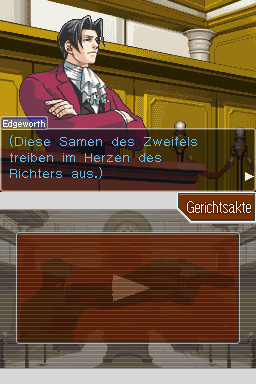
"These seeds of doubt in the heart of the judge.." (unfortunately, I don't remember the exact context of this sentence, so I can't really remember or figure out what exactly austreiben is. However, this sentence is one of many that confirm that Zweifel = doubt, and a verb based off of it, bezweifen, to doubt.)

"These seeds of doubt in the heart of the judge.." (unfortunately, I don't remember the exact context of this sentence, so I can't really remember or figure out what exactly austreiben is. However, this sentence is one of many that confirm that Zweifel = doubt, and a verb based off of it, bezweifen, to doubt.)
Monday, March 30, 2009
March 30, 2009
(The following have been deduced from Phoenix Wright: Trials and Tribulations and Myst IV: Revelations.)
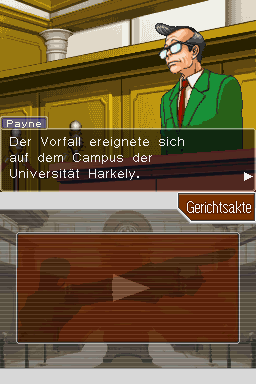
"...on the campus of Harkely University" (Universität is feminine, so use "der" for genitive case. I've also seen this several times elsewhere.)
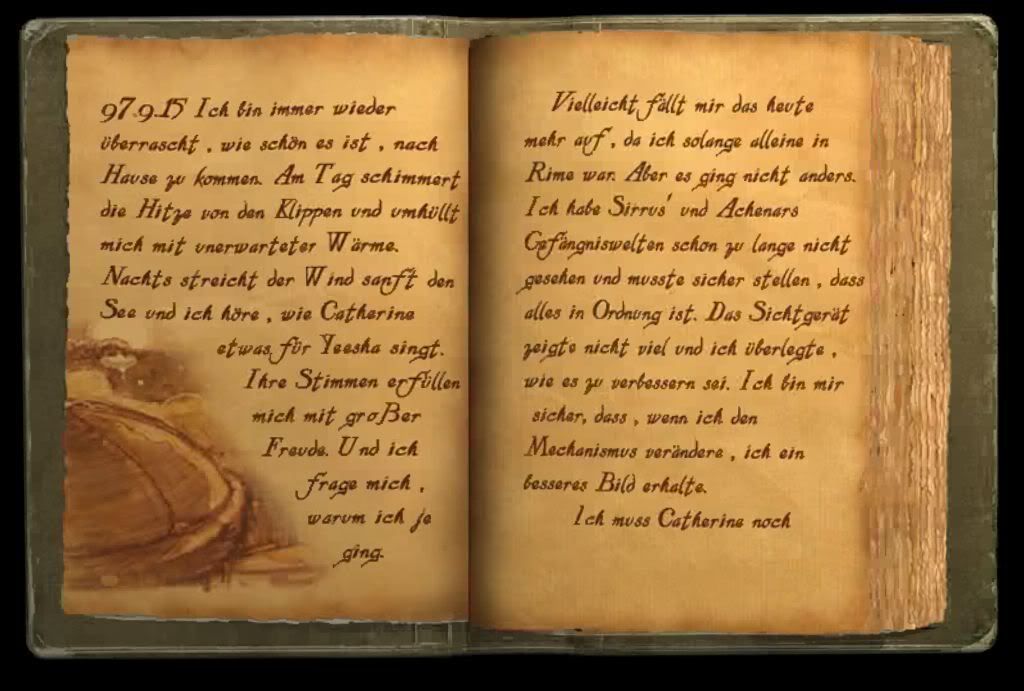
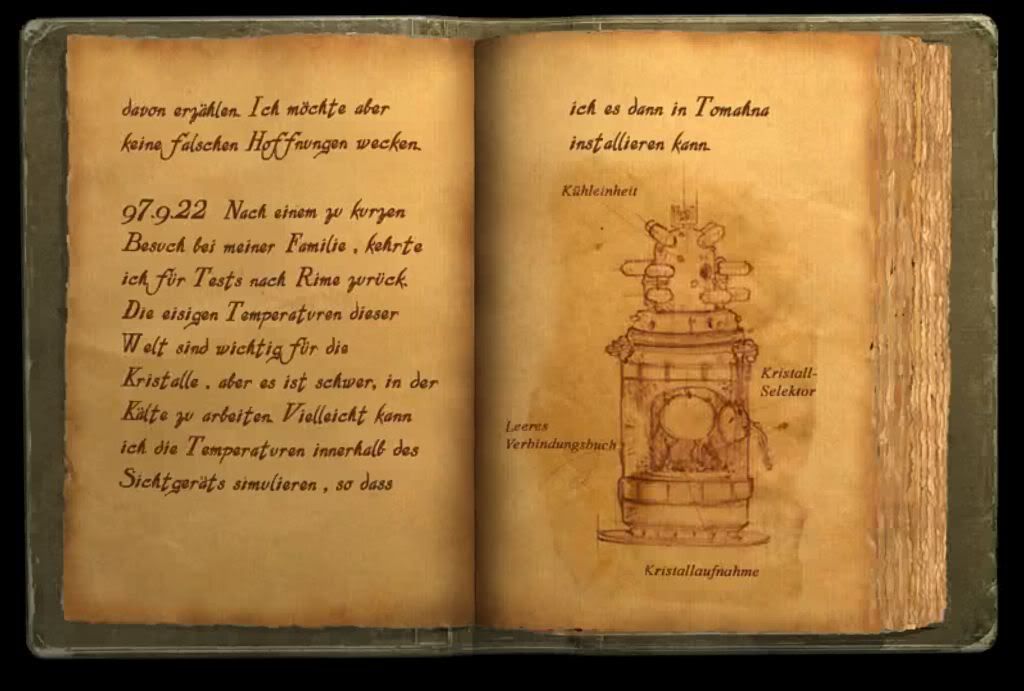
Just wanted to point out that in the second screenshot, we see "Vielleicht kann ich die Temperaturen innerhalb des Sichtgeräts simulieren, so dass ich es dann in Tomahna installieren kann.", which means "Maybe I can simulate the inner temperatures of the sight apparatus, so that I can then install it in Tomahna." ("des" indicates another genitive case, but what gender is Gerät? Now look back on the first page to "Das Sichtgerät zeigte nicht viel und ich überlegte, wie es zu verbessern sei." for "The sight apparatus did not show much, and I 'ponder' how to make it better." Gerät is neuter, and it is an apparatus.)
I now have the complete constructions for genitive cases:
Use des (or end pronouns with -es) for masculine and neuter nouns, and additionally, put "s" on the end of the noun if there isn't already one.
Use der (or end pronouns with -er) for feminine and plural nouns.

"...on the campus of Harkely University" (Universität is feminine, so use "der" for genitive case. I've also seen this several times elsewhere.)


Just wanted to point out that in the second screenshot, we see "Vielleicht kann ich die Temperaturen innerhalb des Sichtgeräts simulieren, so dass ich es dann in Tomahna installieren kann.", which means "Maybe I can simulate the inner temperatures of the sight apparatus, so that I can then install it in Tomahna." ("des" indicates another genitive case, but what gender is Gerät? Now look back on the first page to "Das Sichtgerät zeigte nicht viel und ich überlegte, wie es zu verbessern sei." for "The sight apparatus did not show much, and I 'ponder' how to make it better." Gerät is neuter, and it is an apparatus.)
I now have the complete constructions for genitive cases:
Use des (or end pronouns with -es) for masculine and neuter nouns, and additionally, put "s" on the end of the noun if there isn't already one.
Use der (or end pronouns with -er) for feminine and plural nouns.
Saturday, March 28, 2009
March 29. 2009
(The following have been deduced from Phoenix Wright: Trials and Tribulations and Rammstein (listening exercise revisited.))
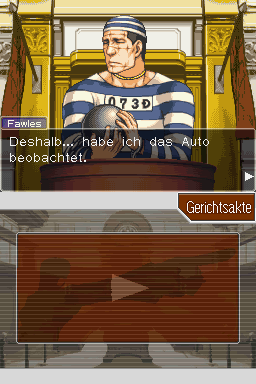
"Therefore...I have watched the car." (beobachten = to watch, observe. Finally!)
Weißes Fleisch (revisited); *=translation correction
Weißes Fleisch!
Du auf dem Schulhof ich zum töten bereit, ja (Yes, Schulhof is a word. If I spelt it correctly. It's a school yard.)
Und keine ihr weißt von mein Einsamkeit,
Roter Striemen auf weißer Haut,
Ich tue dir weh, und du jammest gelaut, (weh is a word; I posted about it in a previous entry.)
Jetzt hast du Angst, und ich bin so weit,
Mein schwarzes Blut, versaugt ihr das Kleid,
"White flesh!
(Now I think that says you on the schoolyard, ready to be killed.)
And none of you know about my loneliness,
Redder streams from the whiter 'body' (Well, it seems to work.)
*I hurt you, and you wimper out loud
Now you are worried, and I am so far,
My black blood soaks your dress, (I think that's what versaugt is.)"
Dein weißes Fleisch erriecht mich sooo,
Ich bin doch nur ein Jigolo (yes, that is a word)
Dein weißes Fleisch erleuchtet mich,
"Your white flesh 'pleases' me so (So I don't really know what erreichen is.)
I am only a gigolo, (I hadn't known this word before. Seriously.)
Your white flesh delights me,"
Mein schwarzes Blut, und dein weißes Fleisch,
Ich möchte immer geiler von deinem Gekreisch, (geiler is a word. I've seen it a few times, but I still haven't figured out quite what it means.)
Der Angschweiss da auf deiner weißen Stern,
Tagert in mein pranges Gehirn,
"My black blood, and your white flesh,
I would like none from your 'gekreisch' (Another word I don't know),
The 'Angschweiss' there on your white forehead (Maybe it has something to do with the worry-wrinkles on her forehead, who knows.)
It is worth in my brain (don't know pranges, or if I heard it right.)"
Dein weißes Fleisch erriecht mich sooo,
Ich bin doch nur ein Jigolo,
Mein Vater war, genau wie ich,
Dein weißes Fleisch erleuchtet mich!
"Your white flesh pleases me so,
I am only a gigolo,
My father was, exactly like me,
Your white flesh delights me!"
Jetzt hast du Angst, und ich bin so weit,
Mein Pranges das ein Acht Lösung schreit,
Dein weißes Fleisch werd Meinschaft folgt,
In meinem Himmel gibt es keinen Gott,
Ooooooh, Gott,
"Now you are worried, and I am so far,
My 'pranges' there cries 'for attention' (Not sure either.)
Your white flesh would follow 'Meinschaft' (Well, Gemeinschaft is company, but I don't know about this one.)
In my heaven, there is no god,
Oh god,"
Dein weißes Fleisch erriecht mich sooo,
Ich bin doch nur ein Jigolo,
Dein weißes Fleisch erleuchtet mich,
Mein Vater war, genau wie ich,
Dein weißes Fleisch erriecht mich sooo,
Ich bin ein trauriger Jigolo,
Dein weißes Fleisch erleuchtet, mich!
"Your white flesh pleases me so,
I am just a gigolo,
Your white flesh delights me,
My father was, exactly like me,
Your white flesh pleases me so,
I am a sadder gigolo,
Your white flesh delights me!"

"Therefore...I have watched the car." (beobachten = to watch, observe. Finally!)
Weißes Fleisch (revisited); *=translation correction
Weißes Fleisch!
Du auf dem Schulhof ich zum töten bereit, ja (Yes, Schulhof is a word. If I spelt it correctly. It's a school yard.)
Und keine ihr weißt von mein Einsamkeit,
Roter Striemen auf weißer Haut,
Ich tue dir weh, und du jammest gelaut, (weh is a word; I posted about it in a previous entry.)
Jetzt hast du Angst, und ich bin so weit,
Mein schwarzes Blut, versaugt ihr das Kleid,
"White flesh!
(Now I think that says you on the schoolyard, ready to be killed.)
And none of you know about my loneliness,
Redder streams from the whiter 'body' (Well, it seems to work.)
*I hurt you, and you wimper out loud
Now you are worried, and I am so far,
My black blood soaks your dress, (I think that's what versaugt is.)"
Dein weißes Fleisch erriecht mich sooo,
Ich bin doch nur ein Jigolo (yes, that is a word)
Dein weißes Fleisch erleuchtet mich,
"Your white flesh 'pleases' me so (So I don't really know what erreichen is.)
I am only a gigolo, (I hadn't known this word before. Seriously.)
Your white flesh delights me,"
Mein schwarzes Blut, und dein weißes Fleisch,
Ich möchte immer geiler von deinem Gekreisch, (geiler is a word. I've seen it a few times, but I still haven't figured out quite what it means.)
Der Angschweiss da auf deiner weißen Stern,
Tagert in mein pranges Gehirn,
"My black blood, and your white flesh,
I would like none from your 'gekreisch' (Another word I don't know),
The 'Angschweiss' there on your white forehead (Maybe it has something to do with the worry-wrinkles on her forehead, who knows.)
It is worth in my brain (don't know pranges, or if I heard it right.)"
Dein weißes Fleisch erriecht mich sooo,
Ich bin doch nur ein Jigolo,
Mein Vater war, genau wie ich,
Dein weißes Fleisch erleuchtet mich!
"Your white flesh pleases me so,
I am only a gigolo,
My father was, exactly like me,
Your white flesh delights me!"
Jetzt hast du Angst, und ich bin so weit,
Mein Pranges das ein Acht Lösung schreit,
Dein weißes Fleisch werd Meinschaft folgt,
In meinem Himmel gibt es keinen Gott,
Ooooooh, Gott,
"Now you are worried, and I am so far,
My 'pranges' there cries 'for attention' (Not sure either.)
Your white flesh would follow 'Meinschaft' (Well, Gemeinschaft is company, but I don't know about this one.)
In my heaven, there is no god,
Oh god,"
Dein weißes Fleisch erriecht mich sooo,
Ich bin doch nur ein Jigolo,
Dein weißes Fleisch erleuchtet mich,
Mein Vater war, genau wie ich,
Dein weißes Fleisch erriecht mich sooo,
Ich bin ein trauriger Jigolo,
Dein weißes Fleisch erleuchtet, mich!
"Your white flesh pleases me so,
I am just a gigolo,
Your white flesh delights me,
My father was, exactly like me,
Your white flesh pleases me so,
I am a sadder gigolo,
Your white flesh delights me!"
March 22, 2009
(The following have been deduced from Phoenix Wright: Trials and Tribulations.)

"True. Except the seat is full of pigeon droppings!" (Taubendreck = pigeon droppings. I think. Tauben = pigeon, Dreck = droppings. Probably. I'm not going to assume it can be used with animals other than birds.)
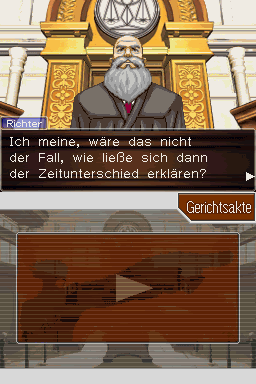
"I mean, were that not the case, how then does one explain the difference in time?" (Not sure about the last bit, but I noticed a different way of using "if", in particular, "if that were not true". It actually just sounds like a different tense or mood for a conditional in German that isn't the same as just a plain if sentence.)
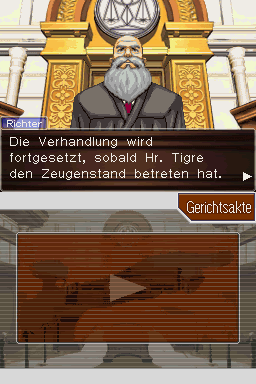
"The case will continue, as soon as Mr. Tigre has stepped onto the witness stand." (sobald = as soon as; there's probably a construction for as [adjective] as in English which goes "so[adjective]" ie, soviel, solang, etc.)

"Hey, the pot there talking about the teakettle, little hairknot girl!" (Tiegel = teakettle or tea pot. I think. It actually looks strikingly similar to the pot calling the kettle black argument.)

"True. Except the seat is full of pigeon droppings!" (Taubendreck = pigeon droppings. I think. Tauben = pigeon, Dreck = droppings. Probably. I'm not going to assume it can be used with animals other than birds.)

"I mean, were that not the case, how then does one explain the difference in time?" (Not sure about the last bit, but I noticed a different way of using "if", in particular, "if that were not true". It actually just sounds like a different tense or mood for a conditional in German that isn't the same as just a plain if sentence.)

"The case will continue, as soon as Mr. Tigre has stepped onto the witness stand." (sobald = as soon as; there's probably a construction for as [adjective] as in English which goes "so[adjective]" ie, soviel, solang, etc.)

"Hey, the pot there talking about the teakettle, little hairknot girl!" (Tiegel = teakettle or tea pot. I think. It actually looks strikingly similar to the pot calling the kettle black argument.)
Subscribe to:
Posts (Atom)
